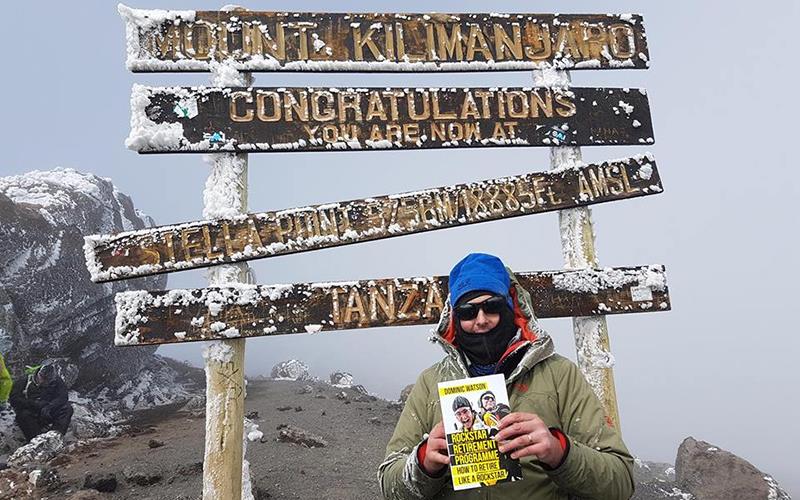Why is it that we work? Is work a means to an end? Or an end in itself? Once we have achieved our desired level of success, do we then have the time to enjoy the fruits of our labour? Or have we become so integral to that success we are unable to take time off?
These are but a few of the questions that Dom Watson, a director of Myers La Roche optical business consultants, asks himself and others. Watson has a particular philosophy on life: most people come to a ‘critical point in their lives where something needs to give or change’.
‘Over the past nearly 20 years, I’ve seen people who have worked ridiculously hard and then have gotten ill and never really had the chance to enjoy it,’ says the 46-year-old Watson. ‘And that’s had a massive influence on me.
‘Some people are cash rich but time poor and they tend to realise far too late that time and health are also currencies that are more valuable than money.’
In short, Watson argues that all too often people become consumed by their business to the degree that, when success is achieved, they are unable to experience or enjoy the benefits that success can bring. This has led him to write his first book – The Rockstar Retirement Programme: How To Retire Like a Rockstar – that examines the philosophy behind a healthy work-life balance.
‘Work-life balance is absolutely crucial,’ says Watson. ‘We [Myers La Roche] see a lot of places where people have never learned to delegate at all, and they take everything on themselves and the business is them. That then impacts on their lifestyle.’
He says, when it comes to optics, only ‘a minority of people actually get it right’.
‘I think people get very consumed by their business and they struggle to separate themselves, and particularly these days with technology,’ says Watson. ‘Twenty years ago, you might have taken some work home, but these days people can dial in on their days off, getting their emails and more at home.’
‘I think it’s a big issue. Modern technologies, when uncontrolled, can have the opposite effect,’ he says. ‘I think it’s very important to switch off in order to provide a good service.’
Trilogy of a Rockstar

Watson (pictured) hopes to spread his message through the written word. His first book became an Amazon best-seller in two categories, and he is due to release his second – The Rockstar Retirement Bucket List, A Bucket List for the Real World – this spring.
‘I became an author because of two reasons: I’m not the greatest public speaker in the world and I wanted to get the message out there,’ Watson says. ‘There was one particular guy who influenced me, someone I would describe as a proper business rockstar, his name was Robert Holmes.’
Holmes was an optometrist ‘who was unusually entrepreneurial’ to the extent that he had moved to the Austrian mountains with his wife, while still managing his two practices.
According to Watson, he was skilled at the ‘art of delegation, automation and outsourcing’. Holmes installed a management team to look after the day-to-day running of his practices and only flew back to the UK a couple of times a year ‘if they were employing someone important like an optometrist’.
‘He was my template and model for how you should run a practice the right way,’ says Watson. ‘He had the wisdom to learn to build teams, trust people and delegate.’
Watson’s books, drawing on lessons from the inspirational Holmes, seek to help those who feel that ‘somewhere along the way their hopes, dreams and aspirations got side-tracked’. His first encourages readers to recognise the importance of a healthy work-life balance, while his second will provide a ‘Bucket List For The Real World’, presenting a variety of experiences and activities that can help a reader strike that optimal work-life equilibrium. His third and final will then focus on how business owners can create the time and space in which to follow such pursuits.
‘The third book is going to be the “Business Owner’s Bucket List” and will be much more technical about how you can move yourself from being a key person in that business to developing a team around you,’ says Watson. ‘It will be practical steps to help you achieve that.’
Despite his drive to release all three books, Watson, true to his own philosophy, is not willing to let his work demands take precedence over his social aims. He postponed the release of his second book – due to be out this month – until spring. Why? Well, because he was climbing the tallest mountain in Africa, Mount Kilimanjaro.
Reaching the summit
Although diligent and hard-working – he often works long days and goes above and beyond for some of his clients – nobody can accuse Watson of ignoring his own advice. Climbing Kilimanjaro in Tanzania had long been on Watson’s personal bucket list and last month he completed the feat, standing on top of the African continent at almost 6,000m above sea level.

Watson at the highest point in Africa
‘I quite fancied Everest but my wife didn’t want me to do it because it is quite risky,’ he jokes. ‘Kilimanjaro is just under 6,000m and it’s a fair bit higher than Everest base camp.’
Watson says the ‘catalyst’ for the climb was a running event he had done in Ethiopia three years ago. He was running to raise money for Vision Aid Overseas in a race that was arranged by a man called Martyn Paul.
Watson says: ‘Long story short, he [Paul] has decided that he’s going to give up doing the events and start another business, and I got an email from him saying “our last ever trip is Kilimanjaro”.
‘I’ve always wanted to do Kilimanjaro while I’m still relatively young, with a guy I like, and I knew it would be really well organised, so that was the trigger as to why I did it now.
‘I think it’s often important to have a bit of thinking space and to take yourself out – it just gives you proper context on where you’re at and what’s important.’
Watson did the climb over six days, raising money for Vision Aid Overseas and Water Aid in the process. It took the group four days to reach the summit, with the final day taking 16 hours, rather than the usual 14, to complete due to adverse weather conditions. ‘The conditions were horrific. It was -20 degrees at the top with 60mph gusts of wind,’ he recalls.
The climb down then took an additional day and a half, with conditions worsening even more. ‘Some of the other parties that tried to follow us up got turned back because it wasn’t safe. Nobody summited the next day, so we were very lucky to be able to do it,’ says Watson.
Lists for the everyday
An admitted ‘fan of writing lists’, Watson recognises that undertakings such as Kilimanjaro are not available to everyone. But he insists that the wisdom embedded in his books is transferable to even the smallest of activities.
‘I want to encourage people to be aspirational but not pretentious with it,’ he says. ‘Simple things that are local and accessible are also beneficial. What we want to do is to get people to think more about things they can do easily on a regular, more local basis.’
The website for Watson’s books features a ‘bucket list’ tab that has all manner of suggestions for achieving a rewarding work-life balance. These range from ‘games nights’ to going ‘walkabout in your local outback’ to ‘cage diving with sharks’. The idea is that by prioritising even the smallest of social activities you can create a work-life balance that suits you and, in turn, your business.
‘Making a new meal for your family; for me, that’s actually fairly significant,’ says Watson.
Nevertheless, he hasn’t gotten rid of the adventure bug that sent him to Africa’s highest peak. His next ‘big bucket list item’ is a family trip to South America.
‘So far in my life I’ve done two round-the-world trips with my family,’ says Watson. ‘I’ve taken six or seven weeks out to do that, which I think is really important, and I’m planning to do that again in the next two years.’
Watson will continue to strike that fine balance between work and play, business goals and social aims. Wherever his next trip is, you can be sure of one thing: it will not be his last.
Are you looking for a new role? Go to Optician Jobs to see all the opportunities available
